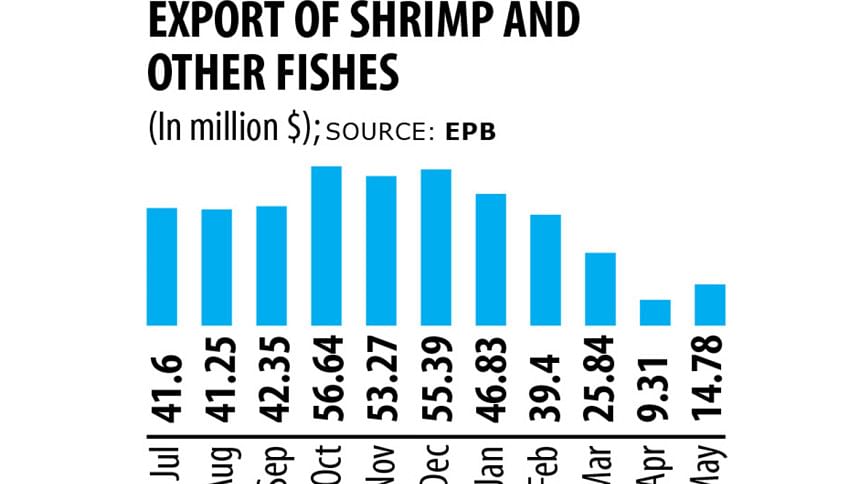Frozen food exporters demand cut in corporate tax

Exporters of frozen food products, especially shrimp, have demanded that the government reduce corporate tax from 32.5 per cent to 15 per cent in the proposed national budget to help the sector recover from a significant fall in international sales.
The demand for frozen shrimp and similar luxury food items has fallen drastically in western countries, Bangladesh's main export market, due to the ongoing novel coronavirus pandemic.
Not only did this lead to a decline in shipments but also got international buyers, who were mostly European, to either return or cancel several consignments of frozen food items amounting to Tk 460 crore in value.
Traders have been exploring Russia and China as potential export destinations over the past few years but the Covid-19 outbreak has laid waste to consumer demand in both nations.
In order to recoup their losses, exporters attempted to borrow funds from the banking sector, using the returned consignments as collateral. However, the financial institutions did not accept their proposal.
Besides, with international markets yet to reopen due to lockdowns aimed at curbing the spread of coronavirus within their countries, there is uncertainty over whether buyers will pick up their orders anytime soon.
Considering all these issues and the absence of bank loans from the government's stimulus package, both producers and exporters seem to be at risk of a working capital shortage.
Exporters claim that the demand for shrimp at international markets fell by around 30 per cent during the April-May period year-on-year while prices were reduced in the process as well.
Before the Covid-19 pandemic began, the price for a kilogramme (kg) of shrimp was between $12.50 and $13. Now it is down to $10.50 or $11.0.
"However, it gives us hope that buyers started to return last week," said Shyamal Das, managing director of MU Seafood.
MU Seafood shipped three containers of shrimp in May.
"Exports are slowly returning to normal," he added.
During June, his peak time for sales, Das ships up to 12 containers of shrimp. This is dThis June however Das can at most expect to ship seven containers due to the 30 per cent fall in demand in western countries.
For the last five years, the total value of his shipments ranged between Tk 101 crore and Tk 108 crore annually.
At this rate, the company might be able to make a little more than half of his usual export earnings at Tk 70 crore through shrimp and other fish by the end of the year, Das said.
Similarly, Md Jalal Uddin, director and chief executive officer of Crimson Rosella Seafood, said when Italy was ravaged by Covid-19 earlier this year, exports to the European nation fell sharply.
"We need bank support now. The banks are not providing loans from the stimulus packages without collateral," Uddin said, adding that since exports in this sector were on the rebound, exporters and producers need financial support in order to grab the market even during this time of crisis.
"During the March-April period, 90 per cent of our orders were cancelled," said Md Rezaul Hoque, managing director of Modern Seafood.
In most cases, buyers asked for big discounts on previously shipped consignments or wanted to return the goods during that time.
Making matters worse, farmers and exporters in Khulna and Satkhira have been counting their losses following the damage caused by cyclone Amphan amid the slump in demand, Hoque said.
Typically, Modern Seafood exports about Tk 320 crore-worth shrimp each year. This year however, the company would be happy if it makes half of that.
Modern Seafood has already lost Tk 25 crore in order cancellations while the company's single fish farm in Khulna was badly damaged by last month's cyclone.
"I am trying to revive my business by exporting smaller sized shrimp. I hope business returns to normal soon as buyers are now responding to my calls," Hoque told The Daily Star over phone.
The industry now requires government support to face the coronavirus fallout.
"Primarily, we want a reduction of corporate tax from the proposed 32.5 per cent to 15 per cent," said Kazi Belayet Hossain, president of Bangladesh Frozen Foods Exporters Association.
Source tax should also be slashed from the proposed 0.50 per cent to 0.25 per cent, he added.
Hossain also asked the government to make securing disbursements from the stimulus package an easy process so that exporters can cope with the low demand and even lower export.
In some cases, buyers repurchase the returned consignments but at discounted prices, Hossain said.

 For all latest news, follow The Daily Star's Google News channel.
For all latest news, follow The Daily Star's Google News channel. 


Comments